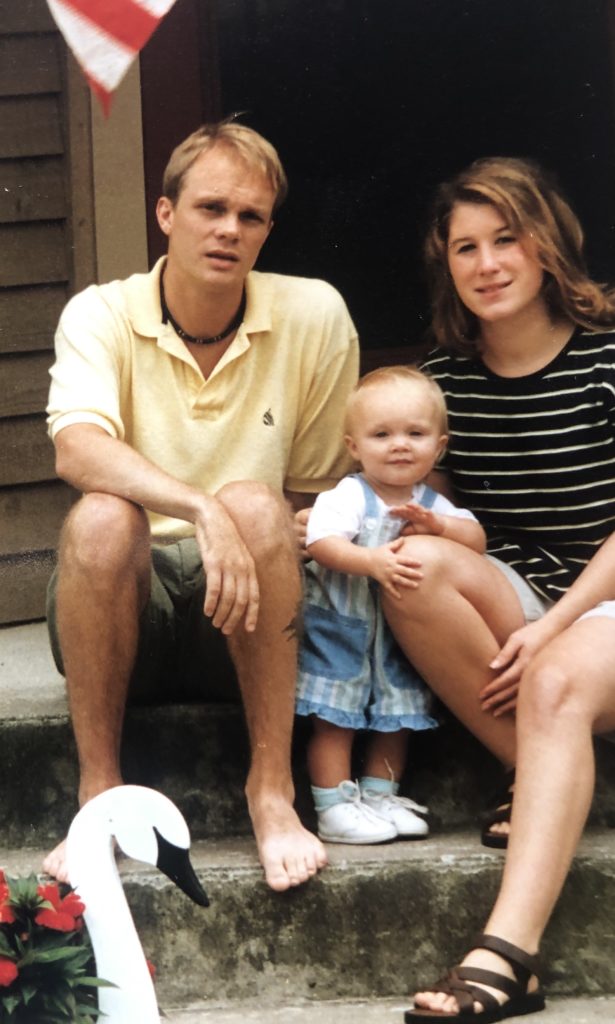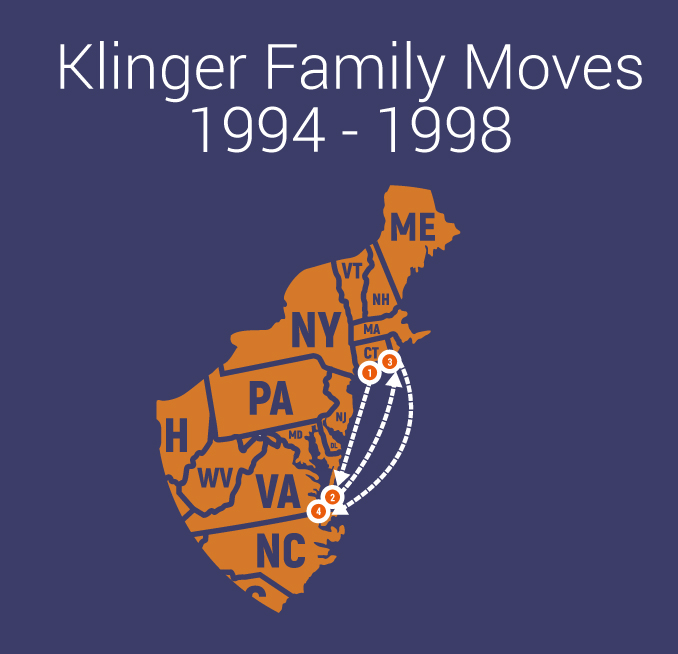Trailing spouses are forced to encounter change more than the average human, often without much support. In my 26 years as a Navy wife, my family has experienced 10 house moves, including five different states and one overseas tour. Throughout this adventure, I’ve continued prioritizing my professional advancement as a creative marketing professional. In the past, pursuing your own career dreams hasn’t been expected of military wives — but times are changing and I hope sharing my story publicly for the first time inspires others to never give up on their dreams.
I was a fiercely independent child. Never liked telling my parents what I planned to do next, or even goodnight. It wasn’t that I liked to keep people guessing, but I would do anything to avoid dependence or predictability. While some dreamed of a wedding and kids, my goals were simple: be self-sufficient and travel to beautiful places.

So, when I met my husband in college, a rebellious neighbor who wore a red bandana like Axl Rose yet planned to enlist in the U.S. Navy after graduation, how could I resist? Neither of us came from military families; his plan sounded like an incredible adventure. Looking back now, 26 years later, I clearly had no clue what I was getting myself into!
Newly armed with my fine arts degree and wedding ring, I was excited to start my career and make my parents proud. Personal computers were still fairly new — we had just landed color Macs the year I graduated — and I had excelled in my program which was a major in graphic design. Netscape now had 256 colors; pushing pixels and learning HTML was fun for someone with my analytical strengths and math skills.

During my senior year at the University of Connecticut, my husband had been across the country, in C school training for preventive medicine in California. I couldn’t wait for the day he came home, and right before moving to his first duty station, we had a precious baby girl.
My ambitions immediately switched from supporting my passion for art and outdoor adventure trips to providing this newborn a stable, happy life. Not an easy task when you move alone to your first Navy base (an 8-hour drive from family and friends), your husband is off on a 6-month deployment, and you have no job offers or clear prospects. Based on the Gupte Scale‘s categories of destination, timing, and resources? This relocation scored a depressing 6/15.
Starting from scratch
On the other hand, the future was bright: I was 22 years old, with a college degree and a loving husband who had made sure we had comfortable housing off-base and utilities set up before shipping out. To this day, I have never lived on a military base; I wonder how that distinction has influenced my career path. At the time, I didn’t realize that most Navy wives were stay-at-home moms, filling their days with the family activities and support systems provided by the military. My infamous independence drove my decisions; I felt it was important to quickly establish my own income and take advantage of the new degree I had just worked so hard to earn. Also, my own mom had never gone to college; I watched her frustration years later, after raising four kids, trying to get a job and getting paid nothing near what she was worth. That wasn’t going to happen to me.
I quickly found a graphic design job and daycare services near our Virginia home — but within a year, my company decided to move to Chicago. Those of us that couldn’t leave decided to create a startup web firm. We had a salesperson and a programmer; my role was front-end content and design. There I was, a young adult in 1995, a Spuds McKenzie dog named Bullet under my desk at a colleague’s home office, learning client management and chasing the dot-com dream…
Working turned out to be the best decision I made. One advantage of being a military spouse is you don’t need medical benefits (so you can negotiate for a higher salary!), and the internet startup business was a great fit for my risk-taking personality and “all-hats” skill set. I mastered HTML and Flash ActionScript, and found a passion in motion graphics and generating new business.
A strategic relocation
Living eight hours away from our families and childhood friends was difficult, however, especially with both sets of grandparents missing out on their first grandchild’s early years. After three years in Virginia, when my husband got the offer to be stationed in Groton, CT, we grabbed it. At the time, my job was flexible and although working from home was not common yet — remember how slow dial-up speeds used to be? — the startup world was paving a new culture. Since I worked online, I was essentially able to do my job from anywhere. (This move’s Gupte Scale score was 12/15 — pretty good!) Still, we were strapped to stay afloat each month after factoring in daycare costs, and I was also very pregnant with our second child — a lovable baby boy.
We decided to live with my husband’s parents until the baby was born, then find our own place. For about three months I worked out of my sister-in-law’s bedroom, grateful for the help with my daughter. I remember those months as a blur of late-night instant messenger chats (the new rage), a flurry of diaper changes and quality time with my husband’s dad as we often made dinner for the rest of the family.

Once my son was born, we moved into a small ranch style home about an hour from my husband’s family and about two hours from mine. Always ambitious and trying to limit our childcare costs, I decided to care for both kids while working full time from home, which often meant waiting for naps/night or typing with a fussy kid on my knee. While my husband began taking night classes for grad school, I often worked 16-hour days to stay competitive; training for web design was trial and error back then, and when working by billable hour, you ate the hours if you couldn’t get it right the first time. This was a tough juggle, but we needed the money — plus, the work kept me intellectually stimulated in a way that mommy duties couldn’t…
Back to the future
Within the year, both good and bad news arrived. My husband was selected to become a commissioned officer — a big promotion — but this meant we needed to move again. Grateful for the short time we had enjoyed with our extended families, we headed back down to Norfolk, VA.
Upon reflection, this move ranked about an 8 or 9 on the Gupte Scale. We now had more stability, more money and the U.S. Navy even paid for completion of his master’s degree program in health administration. This time, I also had a stronger network in place, a job and two important lessons learned: believe in yourself and accept help when it’s offered.
Continue to Part 2 of Erica’s story.

